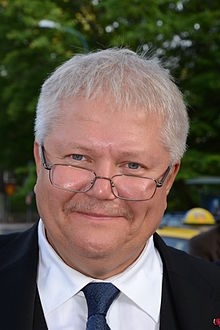
The People's Union of Estonia was a political party in Estonia. Its last leader was Margo Miljand.
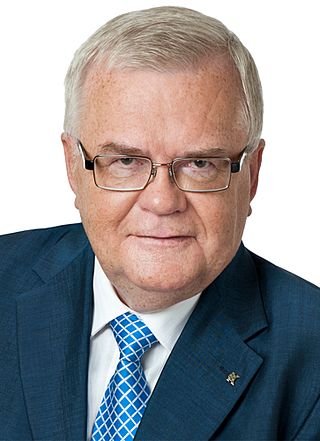
Edgar Savisaar was an Estonian politician, one of the founding members of Popular Front of Estonia and the Centre Party. He served as the acting Prime Minister of Estonia, Minister of the Interior, Minister of Economic Affairs and Communications, and twice mayor of Tallinn.

Konstantin Päts was an Estonian statesman and the country's president in 1938–1940. Päts was one of the most influential politicians of the independent democratic Republic of Estonia, and during the two decades prior to World War II he also served five times as the country's prime minister. After the 16–17 June 1940 Soviet invasion and occupation of Estonia, President Päts remained formally in office for over a month, until he was forced to resign, imprisoned by the new Stalinist regime, and deported to the USSR, where he died in 1956.

Parliamentary elections were held in Estonia on 2 March 2003. The newly elected 101 members of the 10th Riigikogu assembled at Toompea Castle in Tallinn within ten days of the election. Two opposing parties won the most seats, with both the Centre Party and Res Publica Party winning 28 seats in the Riigikogu. Res Publica was able to gain enough support in negotiations after the elections to form a coalition government.

Andrus Ansip is an Estonian politician, a member of the European Parliament, the former European Commissioner for Digital Single Market and Vice President of the European Commission, in office from 2014 until 2019. Previously, he was Prime Minister of Estonia from 2005 to 2014 and chairman of the liberal Estonian Reform Party from 2004 to 2014.
Postimees is an Estonian daily newspaper established on 5 June 1857, by Johann Voldemar Jannsen. In 1891, it became the first daily newspaper in Estonia. Its current editor-in-chief is Priit Hõbemägi. The paper has approximately 250 employees.

Parliamentary elections were held in Estonia on 4 March 2007. The newly elected 101 members of the 11th Riigikogu assembled at Toompea Castle in Tallinn within ten days of the election. It was the world's first nationwide vote where part of the voting was carried out in the form of remote electronic voting via the internet.

Nochnoy Dozor is a group of mostly Russophone political activists living in Estonia. It was set up in the middle of 2006, with its original declared goal of defending the Bronze Soldier, a monument grave marker in Tallinn, near the Estonian National Library and next to a trolleybus stop, against "defacing, relocation and exhumation".

Evelin Ilves is the second wife of President of Estonia Toomas Hendrik Ilves. She was the First Lady of Estonia from 9 October 2006 until their divorce on 30 April 2015.
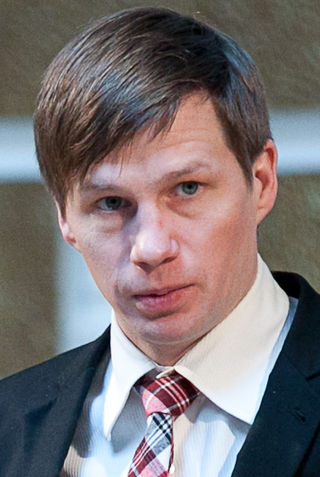
Silver Meikar is an Estonian human rights activist, a freelance journalist and founder of the Estonian Institute of Digital Rights. Silver Meikar was a member of the parliament of Estonia - Riigikogu in 2003-2004 and 2006-2011 in the Estonian Reform Party faction.

The Bronze Night, also known as the April Unrest and April Events, was a number of riots in Estonia surrounding the controversial 2007 relocation of the Bronze Soldier of Tallinn, a Soviet World War II memorial in Tallinn.

The following is an alphabetical list of articles related to the Republic of Estonia.
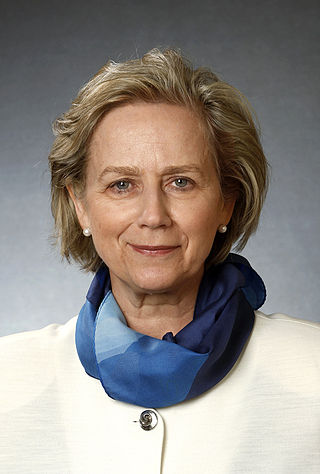
Urve Tiidus is an Estonian politician, member of the Reform Party and former journalist. She was Minister of Culture in Taavi Rõivas's first cabinet. She has been a member of Riigikogu since 2011. Before that she served as the mayor of Kuressaare.
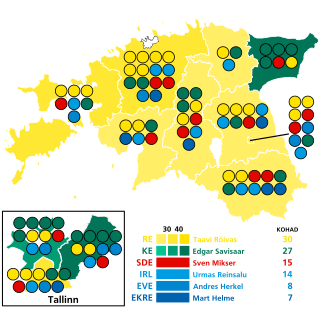
Parliamentary elections were held in Estonia on 1 March 2015. Advance voting was held between 19 and 25 February with a turnout of 33 percent. The Reform Party remained the largest in the Riigikogu, winning 30 of the 101 seats. Its leader, Taavi Rõivas, remained Prime Minister. The newly elected 101 members of the 13th Riigikogu assembled at Toompea Castle in Tallinn within ten days of the election. Two political newcomers, the Free Party and the Conservative People's Party (EKRE) crossed the threshold to enter the Riigikogu.
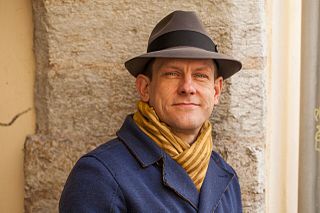
Jan Uuspõld is an Estonian stage, television, radio and film actor and musician.

Kersti Kaljulaid is an Estonian politician who served as the fifth president of Estonia between 2016 and 2021, and was its first and only female head of state since the country declared independence in 1918. She was also the youngest president, aged 46 at the time of her election.
Märt Rask is an Estonian attorney, jurist, and politician who was the Estonian Minister of the Interior from 1995 to 1996, as well as being the Justice Minister in 1992 and from 1999 to 2003 and Chief Justice of the Supreme Court of Estonia from 2004 to 2013.
Ülle Aaskivi was an Estonian lawyer, politician, and public official. Aaskivi was elected a member of the Estonian Supreme Soviet in 1990 and the Estonian Constitutional Assembly, as well as one of the ratifiers of the Constitution of Estonia who voted for the Estonian restoration of Independence. She was elected to the Riigikogu for the Social Democratic Party of Estonia.

Mihhail Stalnuhhin, russified as Mikhail Anatolyevich Stalnukhin is an Estonian politician, representing the Estonian Centre Party from 1996 to 2022. He is a member of the Riigikogu, representing Ida-Virumaa. He was also the chairman of the Narva City Council in 2003–2011 and the chairman of the Riigikogu state budget control committee in 2017–2019.

Triple Alliance is a commonly used political term in Estonia to refer to the various coalition governments between the centre-left Social Democratic Party, centre-right Reform Party and conservative Isamaa or their predecessors. This coalition has formed four times in history - from 1999 to 2002, from 2007 to 2009, from 2015 to 2016 and from 2022 to 2023. None of the coalitions governments have lasted a full parliamentary term. All of the Triple Alliance cabinets have been the second ones of the respective Prime Minister.
